
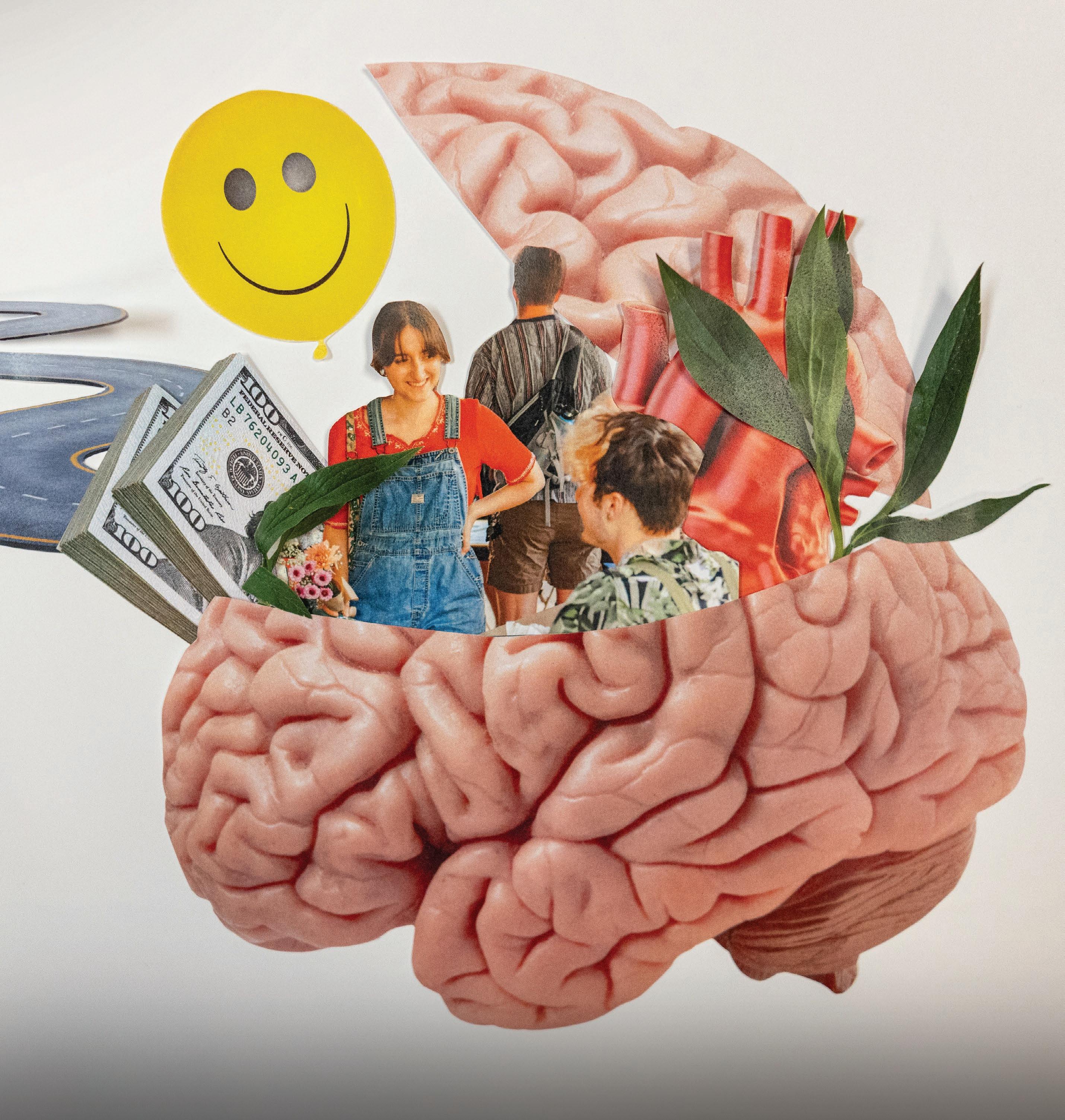

Volume 145, Issue 9 Wednesday, April 3, 2024 @utkdailybeacon | | | The Daily Beacon
HEALTH AND WELLNESS

DAILY BEACON STAFF AND POLICY INFORMATION
EDITORIAL
EDITOR-IN-CHIEF: Abby Ann Ramsey
MANAGING EDITOR: Bella Hughes
COPY CHIEF: Emma Johnston
NEWS EDITOR: Eli Boldt
ARTS & CULTURE EDITOR: Macy Roberts
SPORTS EDITOR: Caleb Jarreau
ASSISTANT SPORTS EDITOR: Jack Church
DIGITAL PRODUCER: Karsten Hoglund
OPINIONS EDITOR: Calie Wrona
PHOTO EDITOR: Cole Moore
DESIGN EDITOR: Emma Fingeret
ENGAGEMENT EDITOR: Sarah Portanka
PAGE DESIGNERS: Jibril Foronas, Katie Goss, Chloe Black
COVER DESIGN: Emma Fingeret / The Daily Beacon
ADVERTISING/PRODUCTION
ADVERTISING MANAGER: Cullen Askew
ADVERTISING REPRESENTATIVES: Jacob
Stromatt
ADVERTISING PRODUCTION ARTISTS: Donatella
Thomas, Ailin Lopez
CONTACTS
TO REPORT A NEWS ITEM OR SUBMIT A PRESS RELEASE, please email editorinchief@utdailybeacon.com
TO PLACE AN AD, please email admanager@utk.edu.
LETTERS POLICY: Letters to the Editor must be exclusive to The Daily Beacon and cannot have been submitted to or published by other media. Letters should not exceed 400 words and can be edited or shortened for space. Letters can also be edited for grammar and typographical errors, and Letters that contain excessive grammatical errors can be rejected for this reason. Anonymous Letters will not be published. Authors should include their full name, mailing address, city of residence, phone number and e-mail address for verification purposes. Letters submitted without this information will not be published. The preferred method to submit a Letter to the Editor is to email the Editor-in-Chief.
CORRECTIONS POLICY:It is The Daily Beacon’s policy to quickly correct any factual errors and clarify any potentially misleading information. Errors brought to our attention by readers or staff members will be corrected and printed on page two of our publication. To report an error please send as much information as possible about where and when the error occurred to editorinchief@ utdailybeacon.com.
The Daily Beacon is published by students at The University of Tennessee on Wednesday during the fall and spring semesters. The offices are located at 1345 Circle Park Drive, 11 Communications Building, Knoxville, TN 37996-0314. The newspaper is free on campus and is available via mail subscription for $200/year or $100/semester. It is also available online at: www.utdailybeacon. com
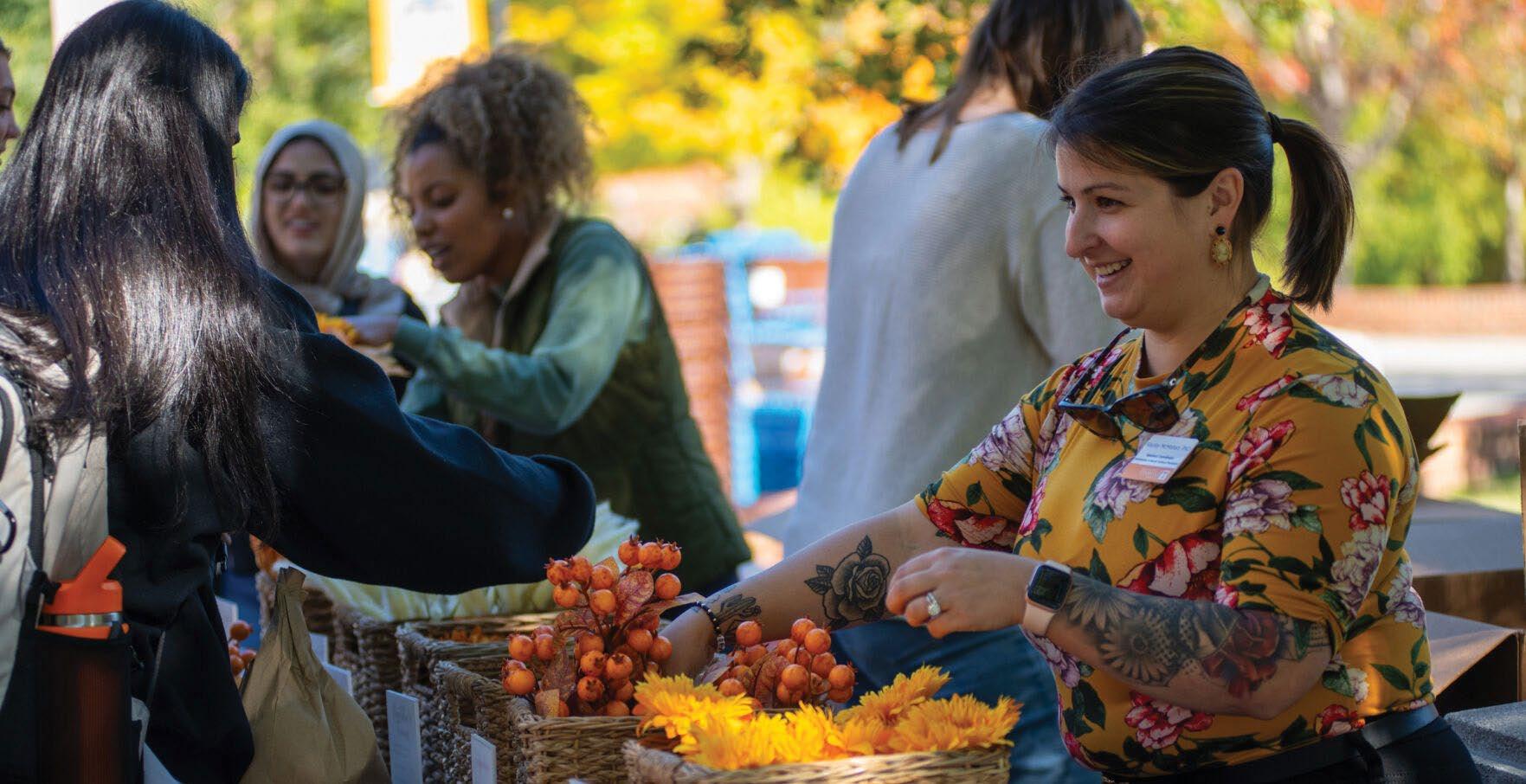
Letter from the Editor: The importance of wellness on a college campus
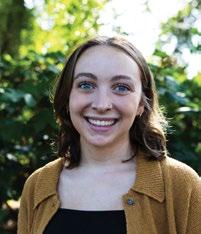 ABBY ANN RAMSEY Editor-in-Chief
ABBY ANN RAMSEY Editor-in-Chief
About two years ago, when I was a staff writer at the Beacon, I had never really written anything related to health or wellness. I somewhat automatically assumed that there were not many stories to tell about health and wellness on a college campus. In my mind, health reporters wrote about COVID-19, health insurance and national policies. I had little idea of what stories were out there for me to tell.
That was until I decided to write what was supposed to be a simple listicle about the eight dimensions of wellness — facets of health that the Center for Health Education and Wellness is passionate about promoting — and university wellness resources. It felt like it would be a straightforward 550-word assignment. It turned into a 1200-word article that inspired me to continue digging into the definition of wellness and how the Beacon covers it.
Maybe for many of our readers, health doesn’t sound like a broad journalism beat. What I realized in that moment, though, is just how all-encompassing it truly is and how much it can intersect with so many other things including but not limited to politics, news, sports, arts, culture, religion, gender, race, socioeconomic status, the environment
and everything in between.
Health isn’t the main focus of everything you read, but at the center of every story lies the health and well-being of a human or humans. And it doesn’t have to be physical health — as journalists, we’re constantly exploring how the story we’re telling impacts our sources’ and our readers’ emotional, physical, occupational, social, spiritual, intellectual, environmental and financial wellness.
We decided to create this special issue not just because health and wellness is inherently embedded in almost every single story we tell but also because it’s especially important on a college campus.
College, for many students, is one of the first times in someone’s lives where they become responsible for their own wellness. Whether it’s learning how to save money to ultimately pay off student loans, figuring out how to feed yourself when you can’t find a home cooked meal or finding a creative way to make friends in the midst of a pandemic, almost every single student on campus is confronted with figuring out one dimension of wellness or another.
In my almost four years at UT, I have met countless students who have seen their personal wellness decline since starting school. I know people who have struggled to get connected with a therapist, haven’t been able to find professional clothing and have wondered how they could have better helped a friend in a dangerous situation. What I have also encountered is many people who are unaware of
all the resources available on campus that aim to equip students with everything they need to address these issues.
We see these resources in so many different places on campus. Students have access to resources through the Center for Health Education and Wellness, the Student Health Center, the TRECS, the Student Counseling Center, the Center for Financial Wellness, the Dean of Students office and countless other departments that strive to make students’ experience at UT as well-rounded and balanced as possible. Not everyone experiences success through using these resources, which is why it’s also important to highlight other ways students can prioritize their own health and wellbeing — like through student organizations that help people find their place on campus.
In this special issue, you’ll find stories that confront the issues students face with solutions and available resources. From what the counseling center is doing to combat wait times to efforts to provide students with basic needs to student organizations that are promoting healthy living, we hope this issue shows you all the ways in which you can consider your wellbeing even when life gets stressful.

The Daily Beacon • Wednesday, April 3, 2024 2
HEALTH AND WELLNESS
The Center for Health Education and Wellness’s Kayley McMahan oversees the Let Love Bloom event on Ped Walkway, helping students build their own fall-themed bouquets. Wednesday, Oct. 18, 2023. File / The Daily Beacon
Spaces around Knoxville are working to make clothing more accessible
ELI BOLDT News Editor
Clothing is a human right, as declared in the Universal Declaration of Human Rights. The right works alongside safety, dignity and the freedom of expression. In local communities, access to free or affordable clothing is often difficult to find or not provided, but spaces around Knoxville and UT’s campus work to fill the need.
The Free Store, an initiative under UT’s Office of Sustainability, is open every weekday and provides clothing for free to UT students. The initiative, which started in 2017, opened a physical store in 2022 to provide more accessible and constant help. Maggie Atchley, the social impact coordinator for UT’s Office of Sustainability, works with projects that divert waste and serve the student community, of which the Free Store is a major part.
“Having clothing enhances your ability to succeed in classes, to access all of the other opportunities that being at a university provides you,” Atchley said. “But lacking that basic need makes that, like, that much more difficult.”
Smokey’s Closet, another university initiative through the Center for Basic Needs, provides business casual and professional clothing to students. Open throughout the week in the Student Union, students are welcome to shop for what they need.
Smokey’s Closet fills a niche of professional clothing, which although often necessary for students and workers, can be expensive. This type of clothing is often required for students. Career fairs, interviews and networking events provide opportunities for students, but without the proper clothing to fit the dress codes, they can be inaccessible.
Donations to the Free Store and Smokey’s Closet come from all over the community, including faculty and staff, but a lot of the donations come from students, which creates a circular economy of clothing.
“That’s one area where I think that it’s important to have this as a community space on campus because it really incentivizes secondhand shopping, builds a community space where secondhand shopping is normalized and celebrated,” Atchley said. “Which also, in a sense, helps to destigmatize poverty.”
At UT, there are diverse levels of socioeconomic status. The Free Store brings in people of all backgrounds and allows them access to clothing without looking down on the need.
Nathaniel Pfeiffer, a junior studying sustainability and a student assistant at the Free Store, noted that other jobs he has held were feeding into unsustainable practices.
“I wasn’t really serving my community in
a way that I wanted to,” Pfeiffer said. “And so by being here I feel like I’ve filled a much more productive niche for social good instead of just for profit.”
These spaces on campus fill the need for students. Outside of university settings, free clothing can also be accessed at ministries and organizations.
Knoxville Dream Center offers professional clothing free of charge through their Fresh Start Clothing Store. Community members need to provide proof of an interview or job they have secured before accessing the clothing. Angelic Ministries International allows people to shop every 30 days for free clothing and hygiene products, and First Aid Collective Knox will hold pop-ups with free clothing.
Many other religious-affiliated organizations provide clothing, but Atchley pointed out that religious institutions can sometimes be exclusionary or triggering to certain populations.
Around Knoxville, there are spaces that provide free or cheap gender-affirming clothing to community members. UT’s Pride Center holds a pop-up called the “Qloset” several times a semester, where students can shop for gender-affirming clothing for free. Binders are also often provided for students.
Knox Pride’s Thriftique provides genderaffirming clothing for under $8 with the stipulation that it is free to anyone in need.
Clothing is the way a person presents themself to the world. It can be either dignifying or dehumanizing. Self-expression, including gender expression, is shown by what people wear. Gender-affirming clothing can be found in secondhand shops, and Pfeiffer noted that the Free Store doesn’t categorize clothing by gender.
“Having clothing enhances your ability to succeed in classes, to access all of the other opportunities that being at a university provides you.”
Maggie Atchley Social Impact Coordinator, UT Office of Sustainability
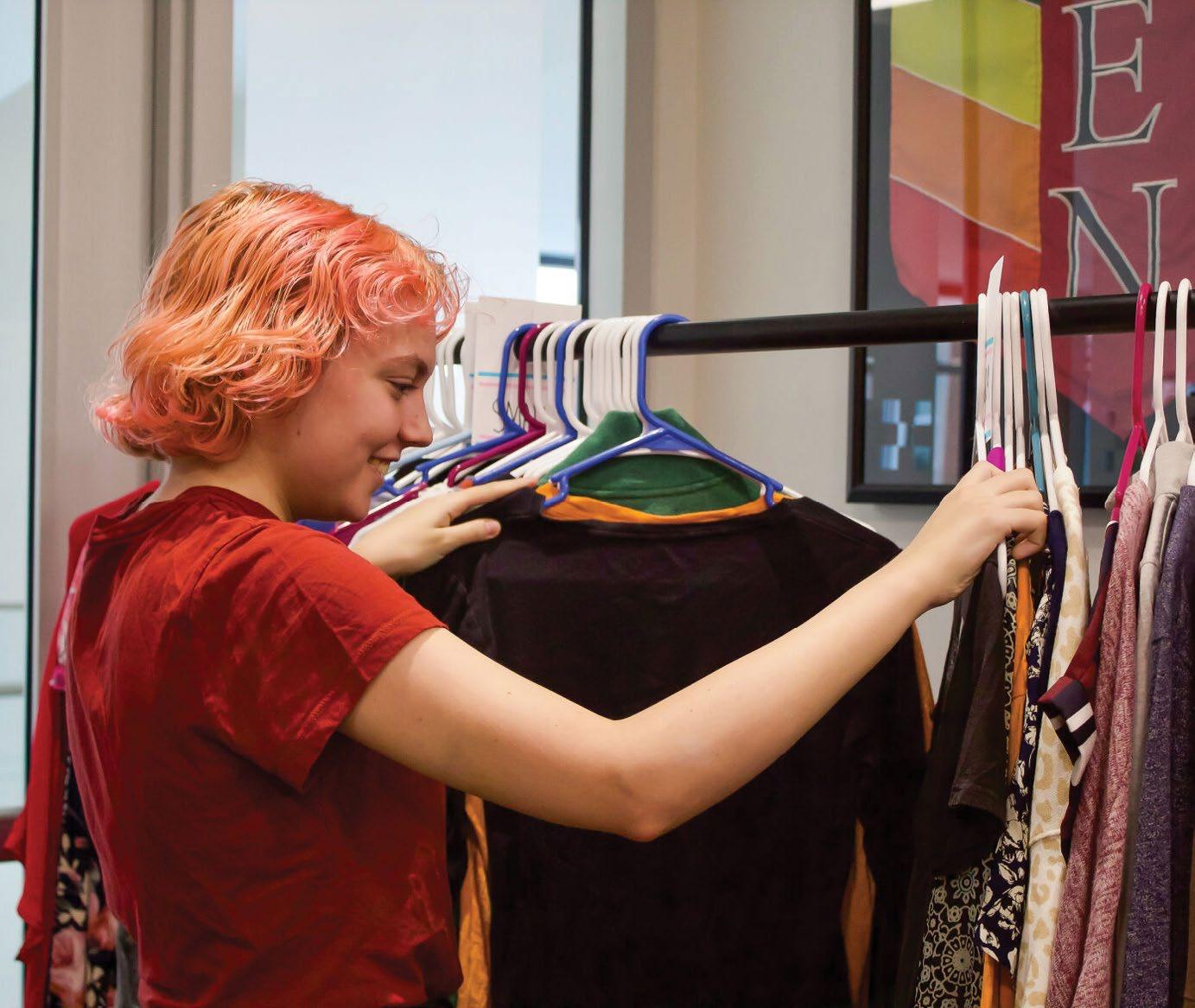

Wednesday, April 3, 2024 • The Daily Beacon 3
Zoe Trainor, a junior majoring in English, sorts through a rack of clothes on pop up in the Pride Center. Wednesday, Oct. 11, 2023. Audrey Nash / Contributor
HEALTH AND WELLNESS
Learning how to account for your financial wellness as a student
CADEN DYER Staff Writer
College is often seen as a way to prevent future financial stress. Get a degree, a good job, start saving for retirement, and everything will work itself out. But paying for college in the first place can be a major source of stress for students.
Seven out of 10 college students feel stressed about their personal finances, and nearly 60% said they worry about having enough money to pay for school, according to the National Student Financial Wellness Study. But though college itself may pose monetary issues, over 75% of students see it as a worthwhile investment and expect to be able to support themselves once they graduate.
The university offers several resources to students who want to implement better financial habits. Review the ones listed below as a starting point.
Center for Financial Wellness
Take advantage of UT’s Center for Financial Wellness as it celebrates Financial Literacy Month during the month of April. Workshops that address things like credit, loan repayment and the psychology of money are great resources

for college students looking to gain some insight into money management. Registration is found on their website.
Additional CFW opportunities
This generation faces more financial choices than any previously. To supplement this, use your UT email to sign up for CashCourse, an in-
teractive website that walks you through topics related to budgeting and good credit. You’ll also learn the key characteristics of student-oriented scams and how to protect yourself against identity theft.
A secondary resource offered through CFW is an interactive spending plan. It shows you how to prioritize different wants versus needs and
introduces the fundamentals of saving for an emergency while simultaneously meeting financial goals.
Have some affordable fun
For most students, the peer pressure to have high spending habits and stay up to date on the latest trends can eat holes into their pockets. Why not spend a few weeks switching out expensive habits for affordable ones that are just as fun?
On-campus opportunities include UT Athletics, the Clarence Brown Theatre and the UT Gardens. If you’re into running, the Neyland Greenway might offer a great change of pace (pun intended) and scenery. Touring the Sunsphere downtown is only $5, while the Knoxville Museum of Art offers free admission and is conveniently located downtown.
Talk to someone
CFW also offers individual appointments with peer guides to go over finances, goals and work out a plan. These can be scheduled through myutk and Vol Academic Connect. Check their website beforehand to see what you should bring.
Money doesn’t have to be scary. Remember that part of college is learning how to handle personal habits, not just academic ones.
Hearted, a new campus initiative, merges mental and heart health for students
JACK DEES Staff Writer
Hearted is an on-campus organization focused on improving students’ heart and mental health. The group was founded this February by Ellie Safer, a junior double majoring in biology and English.
Safer was initially inspired to start Hearted as a way for students to explore the intersectionality between heart and mental health, focusing on the positive relationship between the two.
“I wanted something on campus that had a dual purpose between physical health and mental health. And there’s a bunch of amazing organizations already on campus,“ Safer said. “But I felt like we were missing something that kind of had that dual purpose.
“If you’re exercising a lot, that can have lots of mental benefits. On the flip side, if you’re having really strong mental health and you feel loved and supported, that can make it easier for you to want to take care of your body.”
As a new organization, Hearted has already made waves with on-campus initiatives. First, they teamed up with the Center for Health and Wellness for this year’s Fresh Check Day — an interactive event held for suicide prevention.
Next, the group will work alongside the American Foundation for Suicide Prevention in their “Out of the Darkness Walk” on campus
April 21. Hearted is also working alongside other health initiatives to potentially expand from on-campus events into the greater Knoxville area.
“We definitely have a few walks for suicide prevention coming up. And then we have a couple more mental health-type walks with people around the Knoxville area. And so I think that’ll be a lot of fun,” Blake Hale, vice president of service for Hearted and pre-med student at UT, said.
Physically active events like walks are prioritized by Hearted executives for their multifaceted appeal to cardiovascular and mental health.
“I think if we can spread awareness by reducing a lot of the screen time and staying inside, instead of going outside — especially when the weather’s good, I think you can just rejuvenate your body and your mind very, very well,” Hale said.
In addition to mental and heart health, Safer cites love as the third pillar in Hearted’s healthfocused agenda.
“And I am also just passionate about love in general and love being the greatest of all things. And so when I kind of thought about love … I really thought I could bring together heart health and mental health under kind of one umbrella for an organization,” Safer said.
“I also just want everyone to feel loved. I want everyone to know that they matter and that someone needs them today”
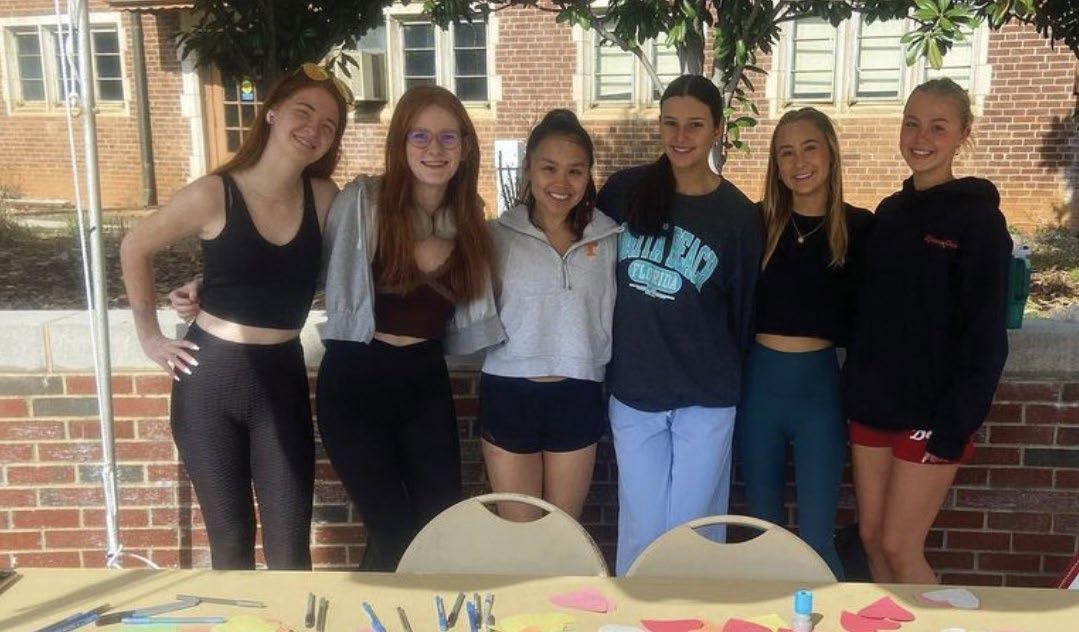
Hearted is a new on-campus organization focused on improving students’ heart and mental health. Courtesy of Hearted UTK
If you would like to join Hearted, you can find the link to their GroupMe through the link tree in their Instagram page. Any student who wants to can join, regardless of major. There are no dues required to join and no set recurring meeting times, though they plan to make them routine eventually. Safer’s one message to prospective members is: “Don’t be afraid to show up!”
“I just want to encourage everyone that
we want you here. And our exec board, if we haven’t seen you before, we will come up to you and talk to you. And we don’t want you to feel like you have to know someone to be there,” Safer said. “We constantly want to see new people, and we don’t want you to feel like it is hard to get in or anything like that. It really is open to anyone and everyone. And that’s the whole point of it.”
The Daily Beacon • Wednesday, April 3, 2024 4
HEALTH AND WELLNESS
Philippa Satterwhite, coordinator of financial wellness and education, welcomes students to the Cones and Loans event in Hodges Library on April 25. File / The Daily Beacon
‘That happy medium’: 5 tips for a healthier diet from an expert
EMMA JOHNSTON Copy Chief HEALTH
From fad diets to MyFitnessPal, college students explore all kinds of ways to foster a healthy relationship with food. But in actuality, many of these methods turn out to be unhealthy due to their short-lasting effects and through perpetuating a skewed mindset in students toward their own bodies.
Nutrition professor and personal nutrition consultant Lee Murphy said a college student’s relationship with food is all about finding a “happy medium.” This compromise looks different from person to person, and it might vary for you from day to day, as college students’ schedules can be chaotic.
But the happy medium allows students to engage in healthy eating habits without feeling ashamed or discouraged when they don’t meet a certain goal due to a lack of time, money or energy.
Here are five tips for how you can achieve a nutritional lifestyle on a college budget while balancing the busyness of college and your overflowing to do lists:
Eat more fruits and vegetables — a little more is still more Murphy’s self-proclaimed soap box is simple: More matters. It’s the name of a national campaign that encourages people to simply eat more fruits and vegetables than they already do. Murphy urges clients to take note of how many fruits and vegetables they eat each day and decide to start eating just one more.
If you typically eat three fruits or vegetables every day, try eating four. If you already eat the recommended five fruits and vegetables a day, be an overachiever and go for six.
If you eat an average of zero fruits and vegetables a day, you’re not alone. According to a thesis by Ashley Citrowske at the University of North Dakota, 7.8% of college students reported no daily fruit or vegetable consumption. Start small and try eating one a day.
“The reason I focus so much on fruits and vegetables is because if you can fit those in, you’re at least having a foundation of nutritious foods in your diet,” Murphy said.
Fruits and vegetables contain dietary fiber which has benefits Murphy described as “limitless.” You don’t have to shoot for the recommended five to experience these benefits — just add a little more into your daily menu.
Find the healthier choice — ‘every little bit counts’
While eating healthy on campus can seem challenging, Murphy said there is “always a healthier choice.” It doesn’t have to be the most healthy option available to be good for you. Try customizing your order at campus restaurants to make them more nutritious by adding foods rich in dietary fiber or protein.
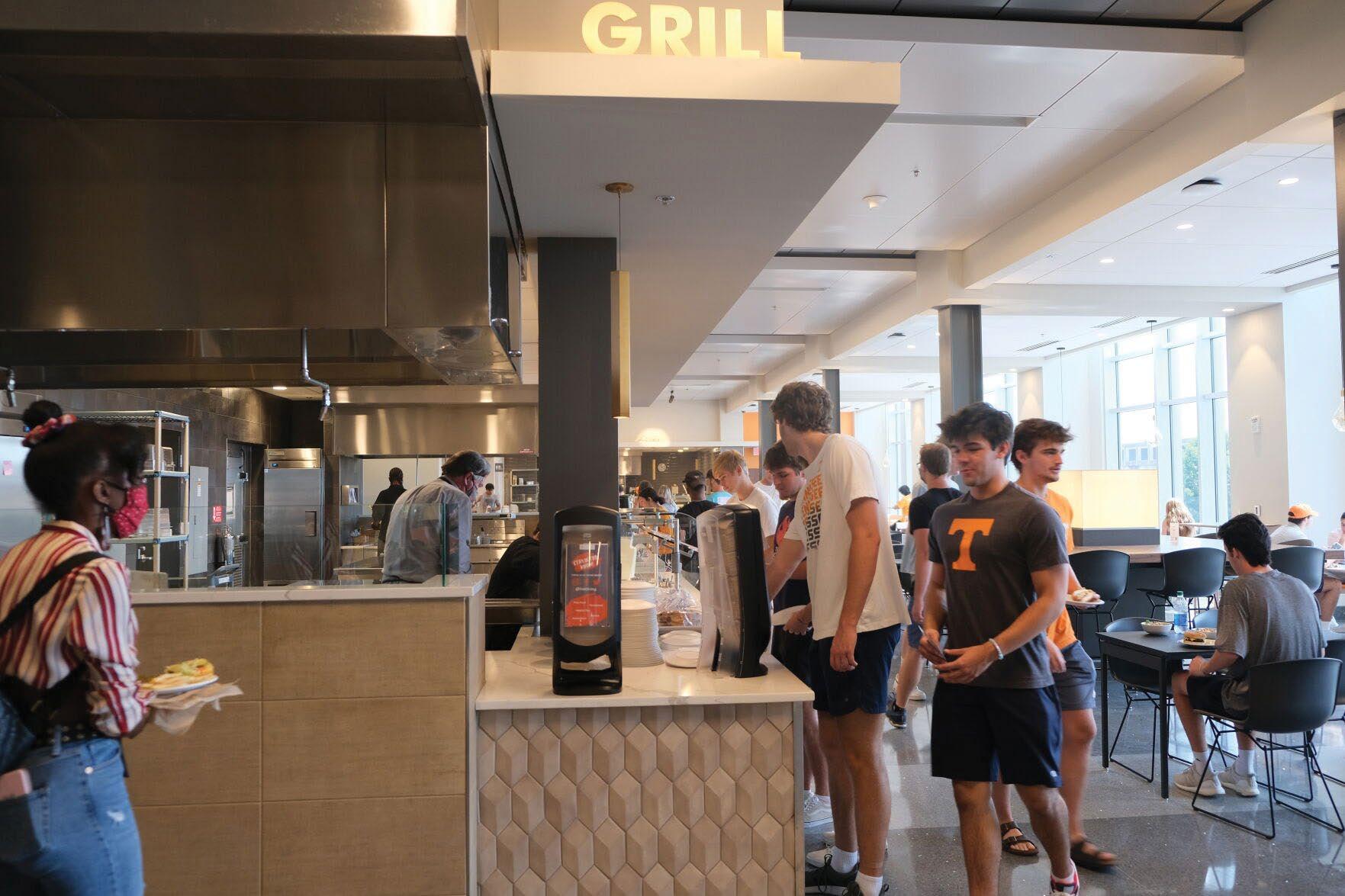
“Every little bit counts,” Murphy said. “Even like having extra vegetables on your pizza, like, that counts even though it’s pizza.”
If you’re getting Twisted Taco, add more lettuce to your bowl or burrito. At Union Deli or Subway, add one more vegetable or whole grain to your sandwich. For smoothies and bowls from Blenz, take a look at the ingredients before you make your selection, and try a healthier smoothie or replace your go-to nutella topping with extra bananas.
Hydrate — don’t die-drate
Hydration is a part of nutrition that can be difficult for students to keep at the forefront of their minds when juggling a full course schedule, a part-time job and extracurriculars. However, it’s one of the cheapest and most important parts of a healthy lifestyle.
Since it can be a challenge to keep track of your water intake throughout a busy day on campus, consider purchasing a water bottle with labels indicating how much water you should drink by a certain time each day. Don’t wait until the end of the day to try to catch up after being dehydrated all day.
“I think keeping it with you and kind of having habits of knowing when you need to try to have a bottle of water drank by, you know, after my first class or whatever, makes it easy,”
Murphy said.
If buying a new water bottle isn’t in the cards for you right now, get a plastic water bottle and use it to set your own goals. For example, try to drink to the bottom of the wrapper by the time you get to your first class in the morning.
Look for good deals, buy frozen or canned foods
Getting more fruits and vegetables into your diet and finding healthy alternatives doesn’t have to be expensive. According to Murphy, there isn’t one store in Knoxville that you “should” be getting all your groceries from. If you’re on a tight budget, look for good deals on frozen or canned foods that will last longer and not go to waste.
“Fresh is generally best, but I would much rather you have canned vegetables than no vegetables at all,” Murphy said. “Even if there is a little extra sodium in them, I would much rather you have that.”
Frozen foods may be cheaper than their fresh counterparts, but when they’re not, try portioning your fresh produce and freezing a share of it to preserve for later. This way, you won’t find yourself wasting money on food that goes bad quickly.
Even though canned foods can contain larger amounts of sodium and added sugar, they can
also be a cheaper way of adding nutrient-dense foods into your diet.
Focus on the habits you can change
When it comes to a healthy relationship with food, part of the battle lies in your mindset. On top of the emotional stressors of college, students often face mental health struggles. These are commonly accompanied by negative body image, negative self-talk and lower self-esteem, and they can involve disordered eating.
According to Murphy, your physical wellbeing and your mental well-being are directly related. She said it’s important to find a “happy medium” when building healthy eating habits so that you take care of your mental well-being as well.
Taking steps to accept your genetics and your body’s tendencies is something Murphy emphasizes when making recommendations to clients. She encourages them to focus on habits they can actively change for the better rather than fixating on their natural body type and genetics.
“We feel better about ourselves when our body actually feels better, and then you can do the things you want to do,” Murphy said. “And I think all of that goes hand in hand.”
She believes in giving the body what is good for it, and in turn, that will provide for the mind as well.
The Daily Beacon • Wednesday, April 3, 2024 5
WELLNESS
AND
Students eat at Rocky Top Dining Hall on the west side of campus, where grill tops offer plant-based and vegetarian options. File / The Daily Beacon
A double standard
As stigmas surround men’s mental health, UT students and alumni speak out about their experiences.
SHELBY WRIGHT Staff Writer
This article talks about sensitive subjects relating to suicide, pornography addiction, OCD, anxiety and depression. Please be advised.
Common stigmas surrounding men’s mental health keep most men who suffer from mental health disorders from speaking out and receiving the proper treatment they need. Phrases like “man up” and “tough it out” have caused some men to bottle up feelings and find unhealthy coping mechanisms because they’re not sure where else to turn.
In the United States, 1 in 10 men suffer from anxiety or depression, but most cases are often undiagnosed. Men are also four times more likely to commit suicide than women, making suicide the eighth most common cause of death among men.
Interflora, a flower company, commissioned a study that discovered that only 88% of men receive flowers during their lifetime, and the first time some receive flowers is at their own funeral.
According to a 2023 UT graduate, whose name has been omitted in order to protect his privacy, this represents a double standard society has against men, which negatively impacts their overall perception of themselves. The simple fact that women are expected to receive flowers more than men shows how much society is emotionally insensitive to a man’s well-being and feelings until it is too late.
The UT alumnus told The Daily Beacon that while he has since made improvements in his mental health battles, it took him many years to learn how to be comfortable talking about his struggles with others, especially male therapists who seemed to downplay his feelings.
“Men are supposed to be seen as strong, whether that’s from a woman’s perspective, or even as another male, you want to be seen as strong. And I mean, men do view other men as sometimes weaker by being willing to admit when you have problems, instead of just kind of sucking it up sometimes,” he said.
Colin Zimmer, a sophomore business major, has encountered similar constraints, despite his avid activism for mental health awareness.
“Growing up, I didn’t really have that many friends or not many friends that I could
call mine,” Zimmer said. “I was more of a floater, going between groups and really just not being invited places. … It got to a point that it was just like a really lonely situation. I felt like, ‘I’m nobody to no one, but everybody knows me.’ And that can be a really kind of painful position.”
He said that he encounters the stigma that “men can’t show emotion” almost every day, and this cliche comes from gender stereotypes that are deeply rooted in traditionalism, which has created an endless cycle of emotional suppression that people are just now figuring out how to combat and break the “norm.”
Zimmer is best known for his inspirational gimmicks. He is the elf, teddy bear and Easter bunny student who usually appears around campus near the holidays, handing out candy or giving hugs to students as they walk to class.
He told the Beacon that he came up with these ideas to bring joy to people because you never know who is struggling with something, and a simple act of kindness to make someone feel like they belong can go a long way. He wanted to give others the feeling of belonging and love that he never received from his peers growing up.
When Zimmer came to UT, he noticed that there were no active mental health clubs, so he decided to create a Sources of Strength chapter here. Through this chapter, Zimmer is working hard to not only overcome stigmas surrounding all mental health, but tackling those surrounding men’s mental health has been the hardest.
Zimmer stressed that while it’s not always easy, it’s vital to find people who make you feel loved and accepted, and is a good way to cope, as he’s found, with mental health problems.
However, not everyone has this experience. According to the UT alumnus, as he searched to overcome his mental struggles alone, he found himself falling to lust and pornography as a coping mechanism. He first discovered pornography by accident as a middle schooler, and it didn’t take long before it began to form into an addiction.
A study conducted by the National Library of Medicine investigated the rising concern of mental health reports among university students. The study determined that compulsive internet pornography was a significant contributing factor.
Due to unregulated internet access and social media, the UT alum said that it was very
easy to accidentally come across pornography at a very young age, as he did, and it has contributed to his battle with anxiety and depression.
An analysis of a thesis study conducted in 2017 consistently found that those who were exposed to pornography at young ages were more likely to struggle with depression and have less life satisfaction in their adult years because of the adverse effects pornography has on child development.
The UT alum also struggles with social anxiety and found it hard to find a place on campus where he felt like he could fit in.
“I didn’t feel like I was accepted in a society sort of way. … I felt that I would be judged negatively, whether by a professor, which would affect my grades, or the societal pressure of students looking at me a different way because I viewed my religious beliefs and my political beliefs that were different. … That was really what was kind of my breaking point,” he said.
Will Grubb, a sophomore studying human resource management agreed. Grubb also said that being active and finding hobbies that bring him joy has helped him the most when it came to battling his anxiety and depression.
Grubb also struggles with obsessivecompulsive disorder, which he said is an extremely mischaracterized disorder.
When talking about OCD, most people associate it with neatness and germophobia, but Grubb and other OCD advocates argue that those who truly suffer from it don’t struggle with these issues most of the time.
“You know, like, I don’t have a pocket protector for all my pens — I don’t sanitize everything like a billion times before using it — and I’m not trying to downplay people to do that. … OCD comes in a lot of different shapes and forms, but I just think people say, ‘Oh, my OCD,’ like, it’s not that.”
OCD is a long-lasting chronic anxiety disorder in which a person struggles with uncontrollable thoughts and behaviors that the person feels they must repeat over and over.
Only 2.3% of the U.S. population has OCD, and it only affects 1 in 40 adults and 1 in 100 children. Research on the disorder is widely lacking, and it can be hard to treat.
Many people who have OCD have learned how to manage their symptoms through therapy, avoiding triggers or taking medications, but in severe cases, it can cause extreme distress and be debilitating.
Grubb’s OCD is mild and comes in the form of counting and repeating small tasks in multiples of three. He first began to notice his symptoms in early high school.
“I lock my car three times, lock my door three times. When I’m back home and (I’m with) my vinyl collection and stuff, I have to count all of them. Then I can go to bed. Like, then I know everything’s fine,” Grubb said. Grubb takes medication, but he doesn’t let the disorder define him.
“Everybody’s different. Like everybody has
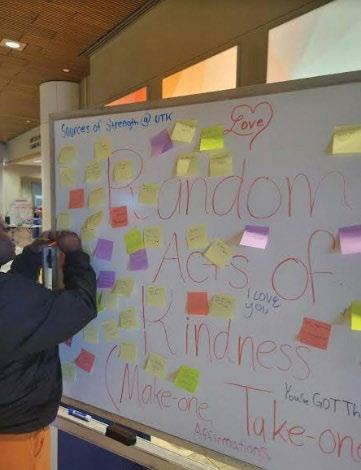
their quirks and stuff, and not many people realize that,” Grubb said. “I know there are people that I’m very close with that have no idea that I count, like, all 100 and something records, but you gotta be able to kind of, like, chuckle at it and know it doesn’t define you. … There are a lot of things about me that you can probably, like, trace back to OCD, but (I’m not) the guy with OCD. … I just let my long hair and music define me — things like that.”
Both Grubb and the UT alum found music as a healthy outlet when confronting their mental struggles. But not through just any music — specifically heavy metal music.
“I feel like metal people are the first to stand up and say, ‘Hey, let’s write a song about, like, addiction — let’s write a song about how like we really feel,’” Grubb said. “And I think it speaks to a lot of people, and it’s part of the reason that community can come so close together.”
While it takes time and patience, healing is possible. Each source consulted in this article is still actively struggling with their mental health.
This week is Sources of Strength’s Mental Health Awareness week, and Zimmer encourages anyone interested in learning more about mental health to participate in various Q&As and events throughout the week. You can follow their Instagram page, @utksourcesofstrength, to learn more.
If you or anyone you know is struggling, you can reach out to The Student Counseling Center, Center for Care and Resilience, Contact Care Line, 988 Suicide and Crisis Lifeline, Crisis Text Line or the Suicide Hotline at 800784-2433.
The Daily Beacon has the right to provide anonymity to sources who face the possibility of physical, emotional, legal or financial harm by providing comment to the publication.
The Daily Beacon • Wednesday, April 3, 2024 6
HEALTH AND WELLNESS
Sources of Strength creates initiatives to overcome the stigmas surrounding mental health, including men’s mental health. Courtesy of Colin Zimmer
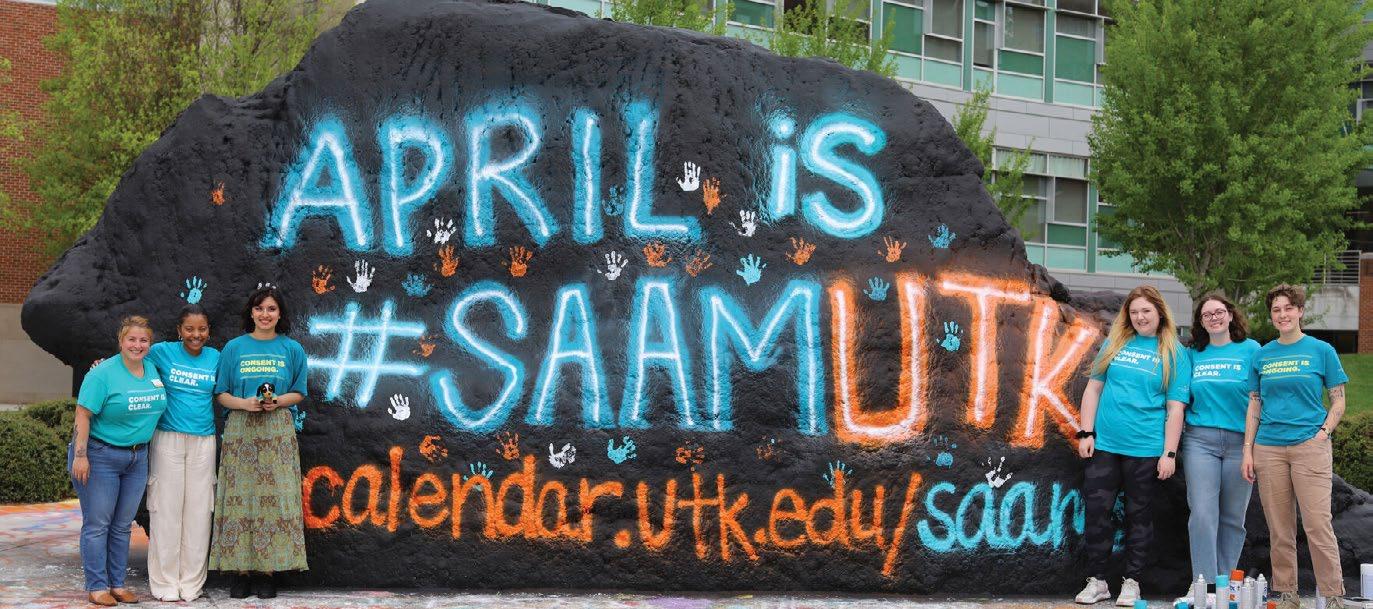
UT prioritizes education during Sexual Assault Awareness Month
ABBY ANN RAMSEY Editor-in-Chief
April marks the beginning of Sexual Assault Awareness Month, a month dedicated to raising awareness about sexual assault. UT’s Center for Health Education and Wellness and Office of Title IX are collaborating to prioritize education, awareness and prevention across campus.
SAAM kicked off Monday with an event where students were invited to paint the rock and get T-shirts to wear on SAAM Day of Action, which was on Tuesday.
Both nationally and on campus, the mission of SAAM is not only to raise awareness but also to communicate to people how they can prevent sexual assault. Laura Bryant the deputy Title IX coordinator for prevention, training and evaluation, and Kayley McMahan, the relationship and sexual violence prevention coordinator at CHEW, said their two offices work closely together in order work toward this mission.
“This awareness month is really about bringing awareness to that issue and that this is something that takes all of us to not only acknowledge but to learn about how we can prevent and respond to support a friend or a family member or get help for ourselves,” Bryant said.
According to the Association of American Universities Campus Climate Survey on Sexual Assault and Sexual Misconduct, 13% of all undergraduate and graduate college students experience sexual assault. Of undergraduate students, sexual assault or rape impacts 26.4% of women and 6.8% of men.
Despite these numbers, McMahan pointed out that many college students might have the misconception that sexual assault only impacts women. One part of educating people on sexual assault awareness and prevention includes breaking down many misconcep-
tions that people have about sexual assault and when it occurs.
Understanding consent can aid in combating these misconceptions. McMahan pointed out that students also have a misconception about consent, frequently being under the impression that consent must be verbal and sober.
According to UT’s policy on sexual harassment, sexual assault, dating, domestic violence and stalking, consent does not technically have to be verbal as it can be communicated through conduct. Additionally, individuals who are intoxicated can give consent, but those who are incapacitated cannot. McMahan said CHEW is working to combat this misconception, especially since it can impact when and how people choose to report sexual assault.
“We’re attempting to address those misconceptions in a few ways,” McMahan said. “So, of course, through the consent campaign, like getting the definition out there, and then we’re really trying to align our prevention with our policy because the last thing that we want to do is put out a definition that doesn’t align with our policy.”
Ultimately, McMahan and Bryant say raising awareness about sexual assault is vital on a college campus as experiencing sexual assault or even knowing someone who has experienced it can impact people’s overall wellness.
“We know that it might just not impact their immediate health and wellbeing and mental health and physical health immediately after an incident,” Bryant said. “It’s something that they can carry with them for years to come. And so I think what’s really important for folks to consider is just that toll that it can take on someone after that experi-
CHEW and the Office of Title IX have many more events planned throughout the month of April, which you can find by visiting calendar.utk.edu/saam.



Wednesday, April 3, 2024 • The Daily Beacon 7 This week’s crossword brought to you by Hibachi Factory Authentic Japanese Grilled Chicken, Steak, & Seafood 865 - 521- 6555 @ ORDER ONLINE NOW! Week of 4/1-4/7 ACROSS 1 Get fast cash for 5 Squandered 9 Up to the task 13 Stay clear of 15 Make simpler 16 Farsi-speaking land 17 Symbolizes 19 Hit the runway 20 Word after under or water 21 From there on 23 Like some sums 24 Passed out 25 Not these or those 28 Coloring stick 29 Detroit's county 30 Oracle 31 Church area 34 Place for gloss 35 Doesn't just ask 38 Like some scientists 60 Teams 11 Medieval 36 Widespread 39 Snow coaster 61 Rid of rind weapon outbreak 41 Italian tower 62 Winter woe 12 Terminated 37 Lines on a city town 63 Prying 14 In demand map 42 Fashion 18 Beer, slangily 40 Sound unit magazine DOWN 22 Stable diet? 43 Part of a song 44 Enumerate 1 Angelic strings 24 Boxing venue 45 Deep-six 46 Fancy, as 2 Rove anagram 25 Mice catchers 46 Lovato or Moore clothes 3 Manage 26 Shadow 47 Swimming 47 Dishwasher 4 Hollywood's 27 Four dimension- hazard soap brand Dunst al realm 48 Raptor's roost 49 Complaint 5 Actor Noah or 28 Stop 49 Yawning, 50 Fret Wallace 30 Clobber, old- maybe 51 Self-government 6 Road division style 51 Ship bottom 55 Kuwaiti, e.g. 7 Repair shop fig. 32 Sneakers brand 52 Nullify 56 West African 8 Into the sunset 33 "Electric 53 Prevaricates nation 9 Plane wing part Avenue" singer 54 "No sweat" 58 Blind trio of song 10 Nike and Grant 57 Trouble 59 Not engaged Nintendo Week of 4/1/24 4/7/24
by Margie E. Burke Copyright 2024 by The Puzzle Syndicate 1 2 3 4 5 6 7 8 9 10 11 12 13 14 15 16 17 18 19 20 21 22 23 24 25 26 27 28 29 30 31 32 33 34 35 36 37 38 39 40 41 42 43 44 45 46 47 48 49 50 51 52 53 54 55 56 57 58 59 60 61 62 63
The Weekly Crossword
ence.”
HEALTH AND WELLNESS
The Office of Title IX and the Center for Health Education and Wellness are collaborating during April to host events for Sexual Assault Awareness Month, which kicked off Monday with an event to paint the rock. Monday, April 1, 2024. Hayden Formica / Contributor
An advocate for students across the state
The UT System’s inaugural chief wellness officer Jessi Gold is dedicated to improving mental health on UT campuses.
MACY ROBERTS Arts & Culture Editor
As of Feb. 1, Jessi Gold assumed the position of inaugural chief wellness officer for the University of Tennessee System. Gold’s primary focus in this position is to advance mental health culture and resources across all five UT campuses — Knoxville, Chattanooga, Pulaski, Martin and the Health Science Center at Memphis. While Gold will focus efforts on faculty and employees, she said her largest focus is on students.
During the first six months to one year of her position, Gold will conduct a needs assessment by visiting each UT campus to learn more about its unique culture and existing health resources. She seeks to learn about how students benefit from current initiatives on campuses and ways they can improve.
“I think that one of the cool things about the job is it wasn’t created out of a crisis, and I have to run in and fix a bunch of things immediately,” Gold said. “You’ll often see jobs like this coming to be because something bad happened, and then they need to do things and they need to do them quickly. The good thing is we have a little bit of time. … I can figure out what’s working and not. I can figure out all the great stuff that people have been doing and really understand it.”
After graduating with a bachelor’s and master’s degree in anthropology from the University of Pennsylvania, Gold’s passion for talking to people and learning their stories led her to pursue psychiatry at the Yale University School of Medicine. According to Gold, psychiatry is the only specialty in which practitioners can spend time with people and see their stories and backgrounds really matter. She went on to pursue her residency and fellowship training at Stanford University. Gold described college as an especially unique time for mental health stressors, as it’s often the first time people are away from home and are surrounded by people constantly. It’s also a time for identity explora-
tion, when people try substances for the first time and when mental illnesses like bipolar disorder and schizophrenia manifest, she said. Academic and social pressures also contribute significantly to college being a challenging time for mental health.
Gold said that when she was in college, she sought help from her campus counseling center. However, she was told she “wasn’t sick enough” and was turned away.
“I think college students struggle with kind of comparing everything on objective measures,” Gold said. “So like if your grades are fine, you must be fine. I had waited a really long time to get help and totally thought it was fine because my grades were fine. I ultimately ended up finding my own therapist and support and realizing that I did need help.”
Even as an associate professor of psychiatry at the UT Health Science Center and outpatient psychiatrist, Gold said she still sees a personal therapist herself. She frequently shares about her mental health on social media and through writing for publications like The New York Times, InStyle and Self.
“I’m the first to tell you I’m a constant work in progress,” Gold said. “I still burn out. I still have stuff I need to work on in therapy. I still make decisions about my own personal well-being in the context of work. I think it’s important for college kids to see that people in administration that might look like they’ve got it all together, don’t always have it together and have to take care of themselves too.”
While Gold feels comfortable sharing her mental health journey, she says that no one owes it to anyone else to share their own. She emphasized that it’s up to each individual to determine whether or not they want to share about their mental health, how much they want to share and with whom they want to share it.
“I think that especially with social media, there’s this pressure to just talk about all of your stuff,” Gold said. “Sometimes people on social media call it trauma dumping, but I don’t know that people are always prepared for that or absolutely process what they’re
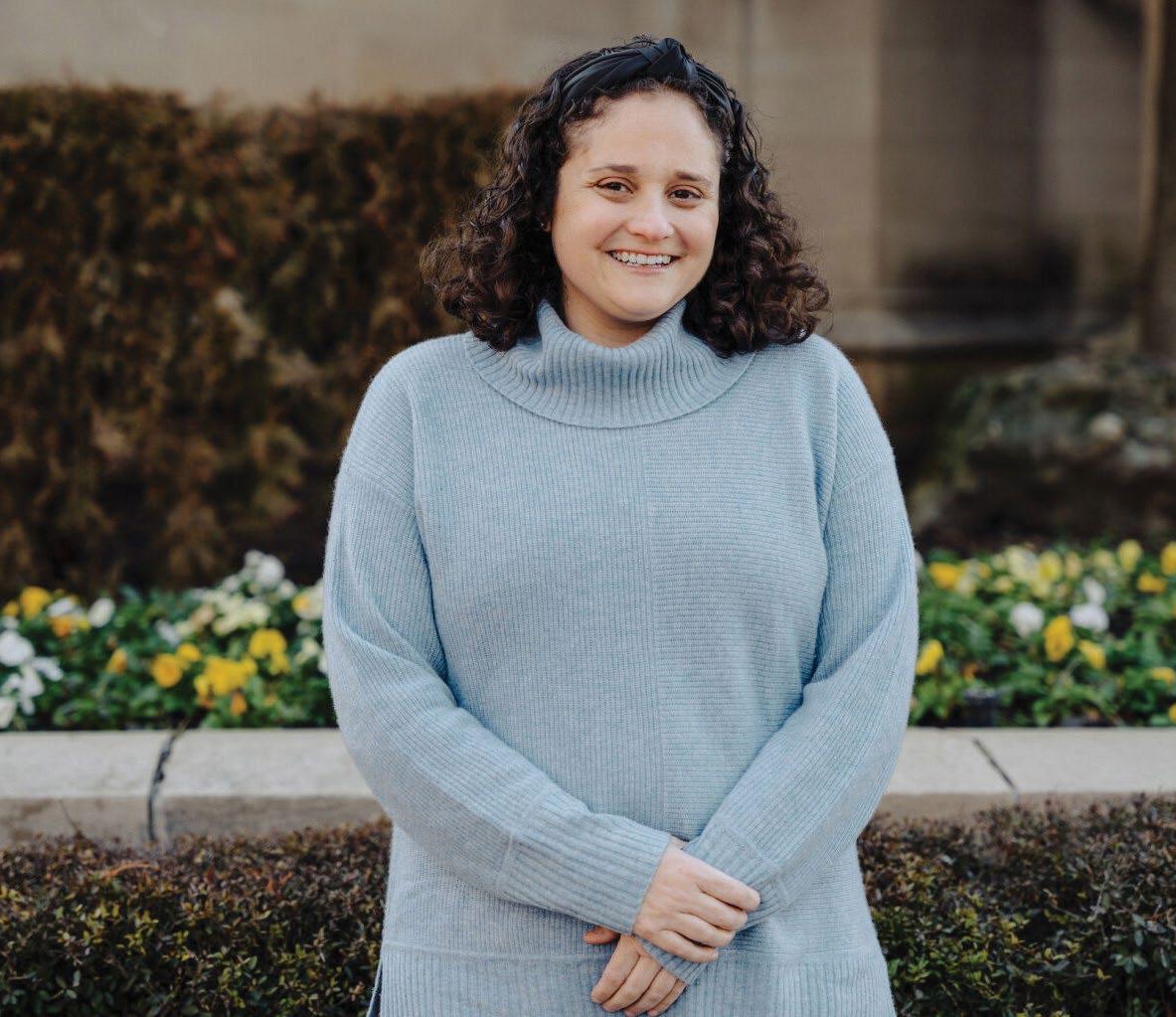
saying or realize the repercussions of that.”
Gold mentioned that at a large institution like UT Knoxville, awareness about initiatives and resources can get lost since there’s so much going on around campus. Although, from what she’s seen so far, Gold said she has seen a lot of thought go into wellness at UTK.
“There’s all these people that have done a lot of work on it and created a lot of programs and are really excited about supporting students,” Gold said. “I think that’s really fun for me because I can see all of the work that people have been doing, what’s going on and how people feel about that.”
Bernie Savarese, vice president for academic affairs, research and student success for the UT System, spoke about the impact Gold will make as chief wellness officer.
“Dr. Gold’s commitment to promoting well-being, coupled with her expertise in counseling, will undoubtedly yield positive outcomes for our UT System campuses and communities,” Savarese said. “She will collaborate extensively to advocate for students and advance mental health and wellness initiatives at UT. Dr. Gold will build upon and bolster the ongoing exceptional work in counseling and wellness across our UT System campuses.”
Being seen as a safe and reliable resource is at the top of Gold’s list of priorities as she begins planning visits to campuses and meeting students in her role as chief wellness officer.
“I’m a big believer that I need to talk to students,” Gold said. “I’m not trying to make any policy or changes or come up with anything without student involvement.”
Gold encourages students to write her whenever they’d like. While she has a busy schedule, Gold said she will always make time to connect with students and use those connections to make UT a better place.
“I think it’s important for college kids to see that people in administration that might look like they’ve got it all together, don’t always have it together and have to take care of themselves too.”
JESSI GOLD
Inaugural Chief Wellness Officer, University of Tennessee
The Daily Beacon • Wednesday, April 3, 2024 8
HEALTH AND WELLNESS
Jessi Gold recently assumed the position of inaugural chief wellness officer for the University of Tennessee System, a role in which she plans to advocate for students’ mental health. Courtesy of Caleb Jia
SEAT, Planned Parenthood work together to distribute contraceptives to students
EMMA CASKILL Contributor
The two student organizations, Sexual Empowerment and Awareness at Tennessee and the Planned Parenthood Generation Action Council, started working together this year to distribute contraceptives to students on campus.
In 2022, Dobbs v. Jackson overturned Roe v. Wade, which allowed women to safely and legally obtain an abortion in all states. Due to this and the pandemic, attendance numbers for both organizations dropped. SEAT struggled with finding someone to step up and take an executive position resulting in the Planned Parenthood Generation Action Council becoming less of a sister organization and now being run by two co-presidents Allison Farley and Ayva Dorris.
The two organizations remain separate for the reason that they serve different purposes. Farley and Dorris spoke about the difference between the two organizations’ purposes on campus.
“SEAT is about sexual empowerment, education and awareness which is part of what Planned Parenthood does, but Planned Parenthood is also specifically about reproductive health care,” Farley said.
“You can have safe sex, but are you feeling empowered while you’re doing it?” Dorris said.
Students need to have outlets for both safe, legal reproductive health care but also an outlet to discover their sexuality while having fun and feeling empowered while doing it. Allison Farley explained more about what sexual empowerment means and the importance of it.
“Our approach has been giving people the information that they deserve that they may not have gotten at earlier stages of their life as well as celebrating the act of sex and celebrating the way that any type of person engages with their own sexuality,” said Farley. “That doesn’t mean necessarily having sex, but as people we all have our own relationship to our own sexuality, and opening a conversation about that, especially in a time of our lives where we are all making decisions about the way we engage in the world sexually, is really important.”
Over the years, students could use a general contraceptive hotline that has access to male and female condoms, dental dams, lube and even menstrual products through SEAT. Under the

presidency of Farley and Dorris, a new emergency contraceptive hotline has been made available to students due to the collaboration of SEAT and Planned Parenthood. The organizations were recipients of a donation of emergency contraception through The Advocates for Youth and EC4EC allowing this to be possible.
The emergency contraception hotline gives students access to condoms, pregnancy tests and a generic emergency contraceptive of Plan B.
“Students can fill out a Google form, and it allows you to choose what products you want in what quantity, along with contact information and a time to meet,” said Farley.
The forms are filtered into two different sections: emergency and nonemergency. An emergency would need action from a hotline responder within a 72-hour time frame depending on
when unprotected sex occurred. In that case, an emergency hotline responder would have the responsibility of getting the contraceptives to the recipient promptly. If the form is filtered into non-emergency, then it will be sent to a different hotline responder.
To get access to the form, there are flyers across campus with QR codes to scan for both the emergency hotline and the general contraceptive hotline. Distribution of contraceptives is also done via tabling on campus.
“The form has been successful, but because it is a new innovation, not a ton of people know about it. Most of the distribution has been word of mouth by tabling or people sending to their friends,” said Farley.
The form connected to the emergency hotline has been active for two weeks and has already distributed more than 30 emergency contraceptives across
campus, and they distribute the same amount every week via tabling.
Dorris and Farley are graduating in the spring, meaning new presidents will be appointed in the fall. Both hope that in the future the organization will continue to work hand and hand with the emergency hotline. The hotline is fully funded by donations, and for it to continue in the future, those contributions need to also continue.
If you want to get involved with the organization or are interested in learning more about your sexuality, SEAT will host Sex Week this month the week of April 15-19. The week will consist of oncampus sex education, empowerment and awareness programming. To keep updated on the schedule for Sex Week, you can follow @SeatUTK on Instagram or look out for flyers across campus.
Wednesday, April 3, 2024 • The Daily Beacon 9
HEALTH AND WELLNESS
Planned Parenthood Generation Action Council is currently working with Sexual Empowerment and Awareness at Tennessee to distribute contraceptives to students. Courtesy of UTK Photography Club
UT Student Counseling Center, student mental health resources work to combat wait times
SARAH PORTANKA Engagement Editor
In the past, many students have found it difficult to get into the UT Student Counseling Center. Some students reported having to wait months for their first appointment while others were forced to opt for group sessions just to get in.
The SCC has recognized this issue and has worked to provide a continuous response. According to Nicole Saylor, director of the SCC, these issues seem to be resolved at this point in the semester.
“At this time there are no wait times, and other than a very brief two-week period at the beginning of fall 2023, the counseling center has been able to accommodate, with few exceptions, every student who has called this academic year with a brief assessment within two weeks of their call, or sooner, as appropriate to their level of acuity,” Saylor said.
The SCC has worked to combat wait times and accommodate students’ needs by filling vacancies, adding new positions and changing the structure of appointment scheduling in meaningful and helpful ways.
Filling vacancies
“For ongoing individual therapy, students typically wait an average of just over four days for an intake appointment once they are placed on the therapy appointment list after their brief assessment,” Saylor said.
Saylor noted that wait times fluctuate at various points in the semester, such as the middle of the semester being at highest demand with the pressures brought on by midterms, work and a multitude of life’s stressors. In times like these, a wait time for a therapy intake session may take up to two weeks.
Saylor also explained that extensive group therapy wait times are not always due to a lack of counselor availability but rather an absence of group members.
“Group therapy meetings require having at least three group members, and there may sometimes be a wait for a group to start while it is forming,” Saylor said.
Adding new positions
In the 2023-2024 academic year, the SCC has hired four temporary part-time therapists who provide therapy to an additional 65 to 70 students every week. Additionally, the SCC has two newly developed permanent mental health therapist positions.
“One of those positions is now filled, and we are currently conducting an interview process to fill the second position,” Saylor said. “We are also in the process of hiring two psychologists to fill existing vacancies.”
The SCC has also added two new postdoctoral resident psychologist positions that will start in August of 2024. Including leadership team members, the SCC will have 20 permanent clinical staff members, six full time psychologist trainees and five parttime graduate student trainees in August of 2024.
Changing appointment structure
Depending on the time of the year, the SCC can look a bit different. The SCC adapts its clinical scheduling to meet the needs of students and to accommodate the academic environment and its unique scheduling demands.
“Just past the halfway point of each semester, the center transitions away from brief assessments and traditional counseling because there is not a sufficient number of weeks remaining in the semester to establish an ongoing therapy relationship,” Saylor said.
Starting the week of March 25, the SCC began offering one-hour Single Session Interventions for students’ initial appointment rather than the traditional half-hour Brief Assessments. This SSI appointment focuses on providing brief, solution-focused counseling support, but one or two additional sessions of brief intervention can be extended if needed.
Beyond one-on-one or group therapy sessions, the SCC offers other resources within its space that may be more accessible at times or preferred by students. One of these resources is a three-part stress management workshop series that discusses ways to engage in healthier stress management techniques, coping skills and time management. The next workshops will be held on April 19, April 26 and May 3 from 2 – 3 p.m. The SCC hopes to expand these offerings in the future.
“We also offer outreach events. Our staff are frequently present at campus events to raise awareness on mental health related topics or provide information on our services,” Saylor said. “Other outreach events include workshops and trainings to student groups that have submitted a request. In addition, we reach out to offer additional support or resources when we are aware of groups of students who may benefit.”
Outside of university space, the SCC points students in the direction of external, often more long-term, resources. One of these resources is the UT Psychological Clinic. While it is an off-campus resource and open to the entire Knoxville community, a sizable percentage of clients are UT students.
“We refer to a wide range of community resources, and we are fortunate to have two such high-quality resources located within academic departments on campus, UT Psychological Clinic and the Counselor Training

Clinic,” Saylor said. “We do frequently refer to both of these resources. We also may refer to specific providers in the community, and we support students to develop the skills and knowledge to effectively navigate accessing mental health resources in the community in their time as students and beyond.”
“I see ourselves as the ‘sister clinic’ to the counseling center,” said Dr. Leticia Flores, director of the UT Psychological Clinic. “We do some similar things, including training graduate students and serving all university students. As such, we try to share resources when possible and may even share referrals if we think one of us can help a student better or more efficiently than the other.”
The UT Psychological Clinic has also experienced extreme wait times, yet unlike the SCC, the clinic sees these wait times as a constant norm.
“We have always experienced extreme wait times, even before COVID,” Flores said. “We also cannot accept all applicants because our graduate therapists are in training, and as such, we cannot take cases where folks are in severe distress, at severe risk of self-harm, engaged in the legal system, etc. So, we always have to refer some folks out into the community. We have a big referral list where we can refer folks for services, but it is up to them to follow up and make appointments.”
Flores acknowledges it is a tough situation for people seeking services. The UT Psychological Clinic consistently works
to combat this difficulty, bringing in new graduate student therapists every fall to take on new clients.
If there is not an immediate availability, both the SCC and UT Psychological Clinic encourage students to remain patient and explore mental health resources beyond therapy or external resources. Other campus mental health and recovery resources include Rocky Top Recovery and UTK Sources of Strength.
In a crisis situation, students can call the SCC at 865-974-2196 to contact an after hours service through an outside contracted company staffed by mental health professionals who can provide crisis stabilization, assessment and resources. For other emergency responses, dial 911 or the Suicide Prevention Hotline at 988.
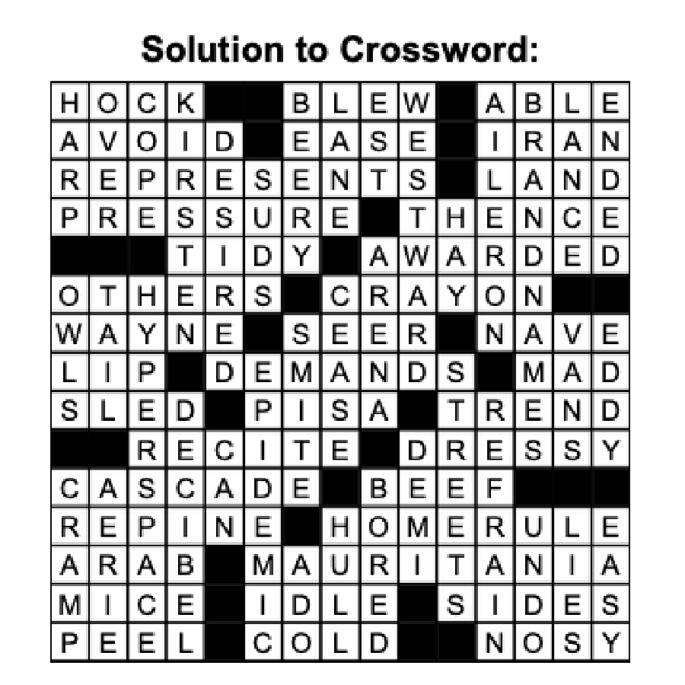
The Daily Beacon • Wednesday, April 3, 2024 10
HEALTH AND WELLNESS
The Student Counseling Center, located across from The Rock, offers services such as group, individual and couples therapy, as well as psychiatric evaluations. Tuesday, Sept. 13, 2022. File / The Daily Beacon
National Society for Black Women in Medicine begins new chapter at UT
SARAH-NICOLE JACKSON Contributor
The National Society for Black Women in Medicine is a non profit organization founded at Florida State University in 2017 by Amber Balkcolm and Ashlei Phillips. The organization was founded because both women realized a need for more representation for minority women in medicine and scientific disciplines.
Bodies are diverse, and people of color will not have the same bodies as white people. However, these differences still are not reflected well in most modern medical practices. Health disparities are prevalent amongst communities of color.
There is a need for more minority health professionals in the field, and this is exactly what UT students Afia Opoku and Alexia Amobi intend to do.
Opoku is a sophomore majoring in biochemistry and cellular and molecular biology and minoring in neuroscience. In her time studying and preparing to go into the medical field, she has noticed a lack of diversity. As a Ghanaian American, this was concerning to her.
“I currently live in Nashville, one of the more diverse cities in Tennessee, and growing up I always noticed that when I went to the doctor, my doctor was a white male,” Opoku said. “The workers in the hospitals and clinics were always white. I don’t want to say it tainted my view of

the medical industry, but it was a motivator that always made me want to do my best.”
Even in modern day, there are still some barriers that prevent women of color from practicing medicine. White women in STEM fields already have to face misogyny from their male colleagues, but women of color have an added barrier: racism.
As a sophomore majoring in nutrition with a minor in public health, Amobi is passionate about spreading awareness about the healthcare disparities in America and promoting more minority healthcare workers. She also operates as the chapter president of NSBWM at UT.
“We should definitely have more inclusivity, which would also impact patient retention and patient care,” Amobi said. “When you have someone that looks like you, you have someone you can relate to, and that improves the quality of your care. We’re here trying to bridge a gap and break these barriers that have been in place for years, before (women of color) were even thought of.”
Opoku and Amobi started the UT Chapter of NSBWM in August of 2023, making it a very new organization on campus.
The organization hosts different events, some restricted to members and some open to the
public.
More minority mental health professionals and minorities in STEM are desperately needed, but due to a lack of education about these healthcare disparities, many remain blind to this issue.
“I think the best way to spread diversity is by letting those diverse people speak for themselves,” Opoku said. “We’ll bring in different physicians of color or bring in medical students who are on different journeys to become doctors. I think our presence alone can really spread that awareness about the need for more minority health professionals.”
The UTK Chapter of NSBWM emphasizes better education about the bodies and health of people of color. Oftentimes, patients of color find their issues or worries waved off because many medical practices were made for white patients.
“Caucasian physicians that are not familiar with how diseases look on colored skin are easily susceptible to misdiagnosing somebody,” Amobi said. “It’s very disheartening because we shouldn’t have to vouch for ourselves to be taken care of. Medical professionals are supposed to take care of the patient regardless of race, color or anything else.”
If you are a woman of color studying health or interested in studying health, consider checking out the UTK Chapter of the National Society of Black Women in Medicine. You can find them on Instagram at @nsbwm_utk.
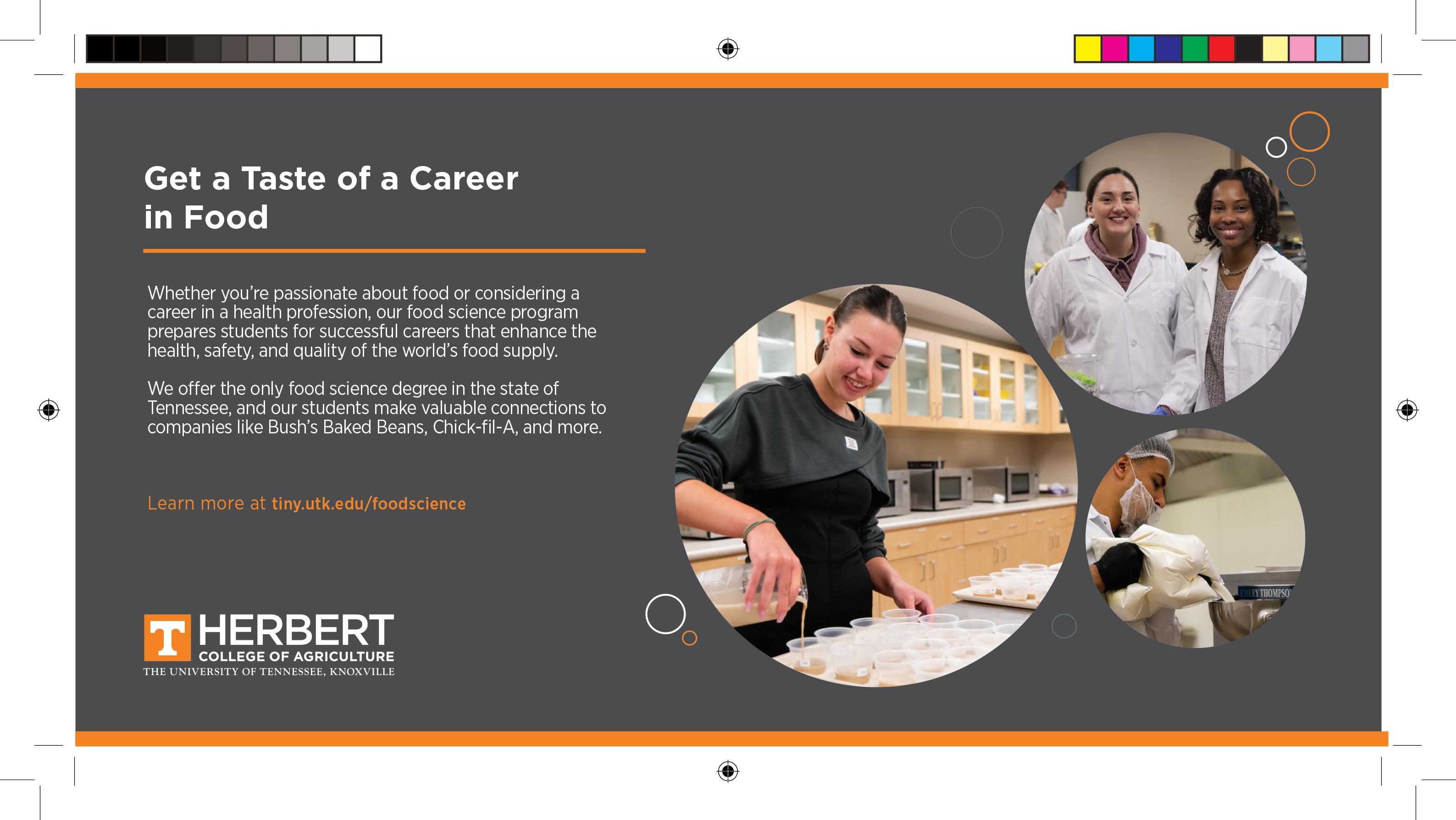
Wednesday, April 3, 2024 • The Daily Beacon 1111
HEALTH AND WELLNESS
UT’s chapter of the National Society of Black Women in Medicine emphasizes better education about the bodies and health of people of color. Courtesy of the National Society of Black Women in Medicine
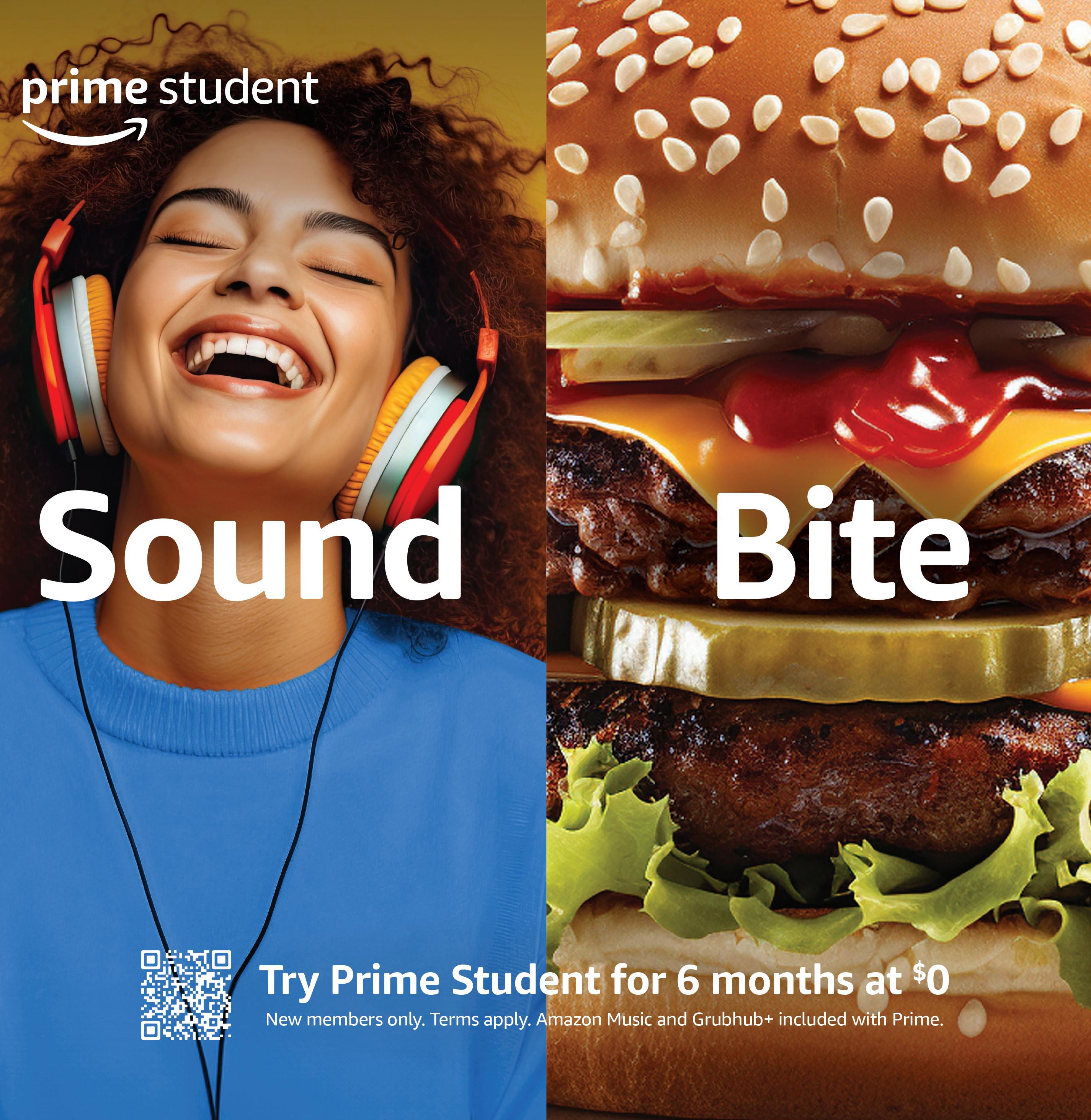
The Daily Beacon • Wednesday, April 3, 2024 12 HEALTH AND WELLNESS






 ABBY ANN RAMSEY Editor-in-Chief
ABBY ANN RAMSEY Editor-in-Chief

















